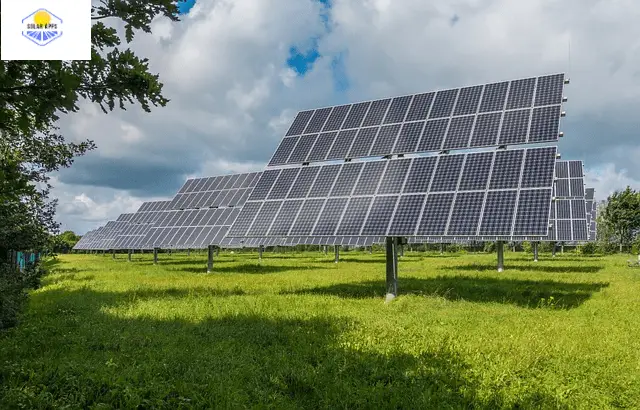Hybrid solar system is that which generate energy by combining two or more sources, the most usage of hybrid solar system is in the form of photovoltaic (PV), batteries, turbine, desal generators. These all give the effective result in hybrid solar system.

solar panals
Contents
Types of Hybrid Solar Systems:
Diesel Hybrid Solar System:
- In a diesel hybrid solar system, we use solar panels combined with a diesel generator.
- Solar energy is used only when the sun is shining during the daytime.
- But the diesel generator also works when the solar energy is low or at night time.
Wind Hybrid Solar System:
- The combination of solar panels with a wind turbine for an energy, system is called wide hybrid solar system.
- This gives us the advantage of the complementary nature of solar panel energy and wind energy, as they often peak at different times.
- That always gives a more continuous power output as compared to the individual solar panel system or wind systems.
Battery Hybrid Solar System:
- Solar panels combine with energy storage systems like batteries.
- Solar power generated energy during the day and stored it in the batteries in the form of energy, and this energy can be use when the low solar power or at the night time.
- Battery store energy and make self dependent.
Hydro Hybrid Solar System:
- This system is combine solar power with hydroelectric power system.
- Solar energy is available at the day time but the hydroelectric power is available at the day as well as at the night time.
- Hydro hybrid solar system is useable for the locations with access to water resources of the system.
Biomass Hybrid Solar System:
- Generate solar energy with a biomass generator.
- When solar energy is insufficient then we use biomass generators. Biomass generators can use organic materials to produce energy.
- That give a chance to make energy with fossil fuel generators. It is cheaper and useable for us.
Advantages of Hybrid Solar Systems:
The advantages of hybrid solar systems are given in the form of increased in reliability, reduced dependence on non-renewable energy sources, and the ability to provide a continuous power supply with the help of storing energy. These systems are mostly used in remote areas, off-grid locations, or in microgrid solutions for improving energy resilience. Hence, they also can contribute to the overall reduction of plants in greenhouse gas emissions by integrating renewable energy sources into the power generation mix.
- Reliability: Solar hybrid systems give us a more reliable power supply by combining different energy sources. This ensures continuous energy production even when one source is not available.
- Energy Independence: By incorporating renewable energy sources like solar power, hybrid systems reduce reliance on conventional fossil fuels, promoting energy independence and sustainability.
- Cost Savings: Solar panel system, is one of the most cheaper system in the world. Once the infrastructure is in place, is generally a free and abundant resource. Combining it with other energy sources can make it to cost savings, especially in remote areas where the cost of extending the grid is high, and no other energy resources are available.
- Reduced Environmental Impact: Hybrid solar systems can play an important role in the reduction of greenhouse gas emissions and also reduced environmental impact as compared to the systems that relying solely on non-renewable energy sources.
- Grid Stability: Hybrid solar systems can use energy storage resources, such as batteries, make relation with grid stability for storing excess energy during the day time and supplying this storing energy when the energy is low and the energy demand is high and also available at the absence of source.
- Versatility: Hybrid solar systems can be adapted to various configurations, allowing them to be deployed in the diverse environments. The applications of it are including off-grid locations, microgrids, and industrial settings.
Disadvantages of Hybrid Solar Systems:
- High Initial Costs: The upfront costs of installing solar panels, additional energy storage, and hybrid system components can be relatively high. However, these costs are decreasing over time as technology advances and economies of scale are realized.
- Intermittency of Renewable Sources: Solar and wind energy can be intermittent, depending on weather conditions. To address this, hybrid systems often require backup sources such as batteries or conventional generators, adding complexity and cost.
- Space Requirements: Solar panels require significant space for installation, especially when aiming to generate larger amounts of power. In some cases, this may limit the applicability of solar hybrid systems in densely populated or space-constrained areas.
- Maintenance Challenges: The maintenance of hybrid systems can be more complex than that of traditional power systems. It involves both solar and non-solar components, each with its own set of maintenance requirements.
- Technological Advancements: The field of renewable energy is rapidly evolving, and newer technologies may outpace existing solar hybrid systems, making them potentially less efficient or cost-effective over time.
- Energy Storage Issues: While energy storage solutions like batteries are improving, challenges such as limited lifespan, resource scarcity (e.g., materials for batteries), and disposal of used batteries need to be addressed for a sustainable energy future.
Summary
In summary, while solar hybrid systems offer numerous advantages, there are also challenges and considerations that need to be addressed, particularly in terms of costs, intermittency, and maintenance. Advances in technology and ongoing research are likely to mitigate some of these disadvantages over time.
Difference Between Off-Grid, On-Grid, Hybrid Solar System
Off-Grid Solar System
Solar panels and batteries
- Not connected to the grid.
- Operate independently from the grid
- Fully independent from the grid
- Requires batteries for energy storage
- Does not contribute power to the grid
On-Grid Solar System
Solar panels
- Connected to the grid.
- Feed excess power to the grid
- Partially dependent on the grid
- No or minimal energy storage (Relies on the grid for storage)
- Feeds excess power to the grid, potentially earning incentives
Hybrid Solar System
Solar panels, batteries, and often a backup generator or grid connection
- May be connected to the grid or not, that depending on the design.
- Use grid as a backup or supplementary power source
- Combines grid power and renewable energy for increased reliability and independence
- Utilizes batteries for energy storage, providing backup power during low solar availability
- Can contribute power to the grid when excess energy is available
